Come join us now, and enjoy playing your beloved music and browse through great scores of every level and styles!
Can’t find the songbook you’re looking for? Please, email us at: sheetmusiclibrarypdf@gmail.com We’d like to help you!
Table of Contents
Remembering Bud Powell, born on this day in 1924.
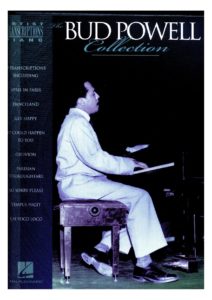
In the same way that Thelonious Monk managed to illuminate the modern jazz scene through compositions not subject to any specific model, Bud Powell (New York, September 27, 1924 – New York, July 31, 1966), dictated the fundamental keys of the new piano language without the need to cling to palpable references. Even today, he constitutes the unsurpassed technical summit of bebop piano and is remembered as the most influential musician of this movement, after Charlie Parker, but ahead of all others, including Dizzy Gillespie.
Best Sheet Music download from our Library.
His childhood was saturated with music, his older brother played the trumpet and violin professionally and his grandfather, Zachary, was the best flamenco guitarist in the United States. His father, a pianist assigned to the “stride” style, supported his early vocation and gave him his first classes.
Bud Powell’s progress was spectacular and at that time, it was common to see him perform Bach compositions and other classics with his friend, Elmo Hope. It was not until 1939, when Powell, got his first important contract with the “Sunset Royals” of the singer, Valaida Snnow, and in 1939 he recorded his first album titled “Reverse The Changers” for the “Duke” label and under the leadership of saxophonist, Frank Sokolov.
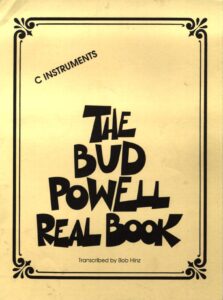
It was not until 1944, when encouraged by Thelonious Monk, he joined Cootie Williams’ orchestra and recorded a very brief solo on “Blue Garden Blues”, the first real example of his colossal talent. That same year he suffered his first arrest for public scandal, and the following years he received a brutal beating from the Philadelphia police that presumably left him forever affected. His mental disorders reproduced, and he was sent to a Long Island Psychiatric Hospital.
Please, subscribe to our Library.
If you are already a subscriber, please, check our NEW SCORES’ page every month for new sheet music. THANK YOU!
In 1946, recovered, he joined the small combo of the double bassist, John Kirby, and by chance this small group was hired at Minton’s Playhouse in Harlem, the “temple” of bebop where Powell came into contact with the leadership of that movement. , which allowed him to participate between 1946 and 1947 in a good number of jam sessions with Dexter Gordon, Jay Jay Johnson, Sonny Stitt, Kenny Clarke and Sarah Vaughan, among others.
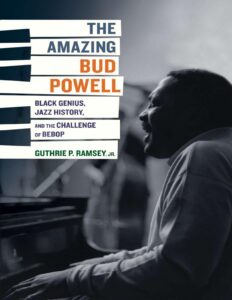
His debut as a leader came on January 10, 1947, for the small Three Deuces label, and in May of that year, he recorded the only studio record for the Savoy with Charlie Parker. A long two-year hiatus, spent mostly in the “Creedmore Sanatorium”, where he even received electroshock treatment, gave way, paradoxically, to his most fertile and artistic period. Starting on August 8, 1949, under the supervision of Alfred Lion and Francis Wolf, Bud Powell left in the coffers of the Blue Note label another vision of modern pianism perfectly compatible with the one that Thelonious Monk had contributed just two years earlier.
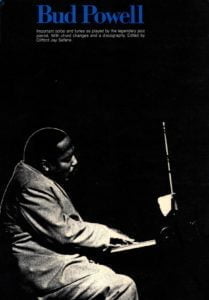
Once again admitted for seventeen months in another Psychiatric Hospital, when he was discharged in February 1953, he formed a stable trio with the double bassist, George Duvivier, and the drummer, Art Taylor.
On May 15, 1953, a historic event occurred in the professional life of Bud Powell. Along with Charlie Parker, Dizzy Gillespie, Charles Mingus and Max Roach, he participated in a massive concert held at Massey Hall in Toronto, Canada, considered the swan song of bebop and perhaps the best jazz concert of all time. From then on, Powell began to enter a phase of profound, almost irreversible mental deterioration, but in 1956 he toured Europe with Miles Davis, Lester Young and Milt Jackson’s Modern Jazz Quartet. He visited the old continent again in 1959, but this time he stayed for five years. Altevia Edwards, better known as “Buttercup”, accompanied him and chose Paris as his place of residence.
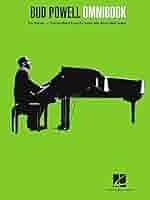
Awarded the honors of a jazz great, he formed a regular trio known as the “Three Bosses” with double bassist, Pierre Michelot, and drummer, Kenny Clarke, who were the main attraction at the Parisian club, “Blue Note.” It was an important period of his life thanks to the care provided to him by Francis Paudras, an extraordinary jazz fan and later author of Powell’s biography “The Dance Of The Infidels.” But suffering from acute tuberculosis, unable to give up drinking, and homesick for New York, Bud Powell returned to the United States. His reappearance in the legendary “Birdland” caused one of the sweet moments of his career. Seven minutes of uninterrupted applause showed that his fans had not forgotten him, but that reappearance was a cruel mirage. His last two years were spent in an apartment in Brooklyn accompanied by his daughter Celia.
Almost at the end of his life, he participated in 1965 in two concerts held at Town Hall and Carnegie Hall, the latter in honor of the tenth anniversary of the death of Charlie Parker, but on July 31, 1966 he died at the Kings. County Hospital” in Brooklyn. More than five thousand people spontaneously took to the streets to honor him and at his funeral, Barry Harris and Lee Morgan played in his honor. As Francis Paudras said: «…. Bud Powell had two personalities. One drove him to fight and overcome his problems, to play and create music. The other dragged him to self-destruction, to an absolute lack of self-respect and the latter would win the game.
In 1986, the French film director, Bertrand Tavernier, produced an extraordinary film that captures Bud Powell’s Parisian period with absolute neatness and fidelity. His film: “Round Midnight”, performed in its starring role by saxophonist, Dexter Gordon, is one of the great films related to jazz.
Bud Powell – Anthropology (1962) LIVE
Bud Powell – piano Niels-Henning Orsted Pedersen – bass Jorn Elniff – drums Live from Café Montmartre, Copenhagen, early 1962.
Bud Powell biography on Wikipedia.
Browse in the Library:
Or browse in the categories menus & download the Library Catalog PDF:
